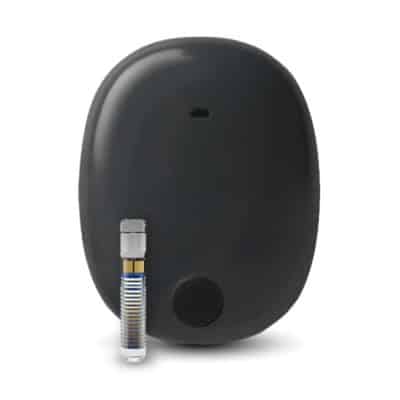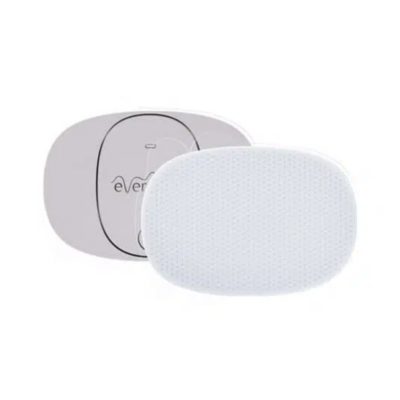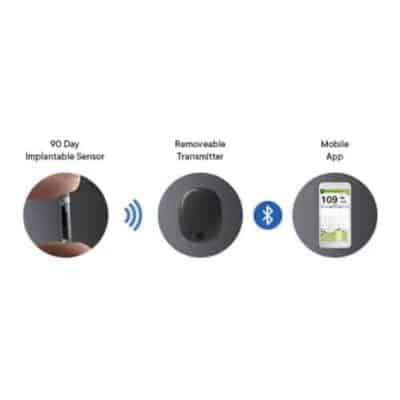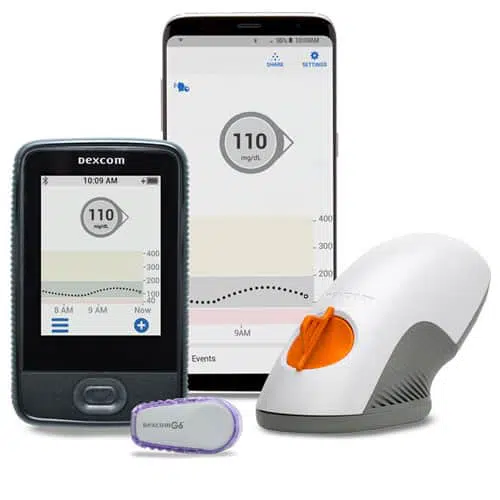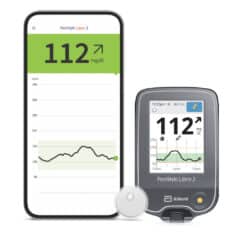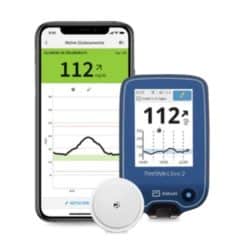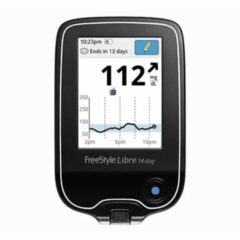Eversense®Continuous Glucose Monitor (CGM)
If you’re looking for a truly long-term continuous glucose monitoring (CGM) system, the Eversense CGM system is the right fit for you. This system’s under-skin sensors allow it to provide fingerstick-free* glucose updates to adults (18 years and older) with diabetes for up to 90 days. But even these sensors won’t last forever, so you’ll want to plan ahead by ordering replacement sensors from Advanced Diabetes Supply.
Please call our Customer Care Team at 1-866-422-4866 or fill out the form below to see if you qualify for a continuous glucose monitoring system with $0 out-of-pocket costs.§
- Lasts up to 90 days
- Provides real-time glucose readings
- Uses light-sensing technology to track glucose levels
- On-body transmitter provides vibration-based alerts
- Sends glucose data to compatible smartphones‡
Thanks to the Eversense CGM system’s under-skin sensors, people with diabetes can get convenient updates on their glucose levels wherever they are. With a lifespan that lasts up to 90 days, these sensors function for much longer than those used in “standard” CGM systems. As is the case for any other CGM system, however, people using the Eversense CGM system must perform fingerstick tests when their symptoms do not align with their glucose readings.
Standard glucose tests aren’t just a pain in the figurative sense—with this testing method, you’ll need to take a finger blood glucose test measurement to get an update on your blood sugar. Fortunately, the Eversense CGM system’s implantable sensors can give you the power to check your glucose levels without fingersticks.* These sensors work along with a removable, rechargeable smart transmitter to send regular glucose updates to your smartphone.‡
When you order replacement Eversense sensors from ADS, we’ll send them straight to your healthcare provider’s office. Then, your doctor will set up an appointment as soon as possible to insert your new sensor—a process that should take roughly 15 minutes to complete.
For information on safely using your Eversense CGM system and sensor, please refer to the user guide linked above.
*Fingersticks still required for calibration and when symptoms do not match sensor glucose readings.
†For qualified persons with applicable in-network insurance and subject to CGM coverage requirements. Deductibles, co-pays, and other conditions apply. Speak to an ADS representative and your insurance company to confirm your coverage and costs.
‡To determine whether or not your smart device is compatible with the Eversense app, check the official Eversense compatibility guide.
Is Eversense Better Than Dexcom?
The Eversense and Dexcom CGM systems are both capable of providing fingerstick-free* glucose updates to people with diabetes, but the sensors used in the Eversense CGM system last considerably longer than those found in Dexcom’s systems. The Eversense sensor has a 90-day lifespan; in contrast, the Dexcom G7 CGM System sensor lasts ten days (not counting a 12-hour “grace period” at the end of its lifespan).
Is Eversense Still Available?
While Eversense manufacturer Senseonics temporarily stopped sales of the Eversense CGM system at the onset of the COVID-19 pandemic, the company has since resumed sales of its CGM systems.
How Long Does Eversense Last?
The sensors used in the original Eversense CGM system will last 90 days (three months) before they need to be replaced.
How Big Is the Eversense Sensor?
The Eversense CGM system’s sensor is 18.3mm long and 3.5mm in diameter.
Is Eversense CGM Implant MRI Safe?
The sensor used in the original Eversense system can safely go through MR systems that meet specific conditions described in the system’s user guide. However, this system’s transmitter is MR Unsafe and needs to be removed before MRI procedures.
How Is Eversense Implanted?
Unlike other CGM sensors, the Eversense CGM system’s sensors need to be implanted by a medical professional. This process should last roughly 15 minutes, and a newly-installed sensor can last up to 90 days before needing to be replaced.
Does Eversense Insertion Hurt?
Since the Eversense sensor insertion process involves the use of a local anesthetic, it should not hurt under normal circumstances. However, there is a chance that the process will cause pain, infection, or irritation.
